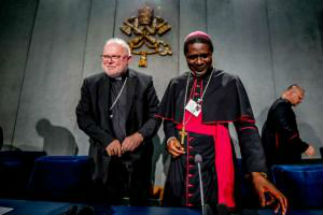We ask you, urgently: don’t scroll past this
Dear readers, Catholic Online was de-platformed by Shopify for our pro-life beliefs. They shut down our Catholic Online, Catholic Online School, Prayer Candles, and Catholic Online Learning Resources—essential faith tools serving over 1.4 million students and millions of families worldwide. Our founders, now in their 70's, just gave their entire life savings to protect this mission. But fewer than 2% of readers donate. If everyone gave just $5, the cost of a coffee, we could rebuild stronger and keep Catholic education free for all. Stand with us in faith. Thank you.Help Now >
Cameroon bishop says Africa offers synod an example
FREE Catholic Classes
While European bishops discuss how to bring young people back to the Church at the 2018 Synod of Bishops, one bishop from Cameroon said that he has the opposite problem.

Highlights
Catholic Online (https://www.catholic.org)
10/24/2018 (6 years ago)
Published in Europe
Keywords: Cameroon bishop, Africa, synod an example
Vatican City, (CNA) - "My churches are all bursting, and I don†t have space to keep the young people," said Bishop Andrew Nkea Fuanya of Mamfe said at a Vatican press conference Oct. 24. "And my shortest Mass would be about two and a half hours," he added.
A study by Pew Research Center in August 2018 found that church attendance and prayer frequency was highest in sub-Saharan Africa and lowest in Western Europe. Four out of five Christians in Cameroon said that they pray everyday.
"People ask me, â€~Why are your churches full?†" the Cameroonian bishop said.
For Bishop Fuanya, it all comes down to family, community, and traditional values.
"Coming from Africa, the family is a very, very strong institution," Fuanya said. "We come from a culture in which tradition normally is handed from one generation to the other."
"Our traditional values still equate to the values of the Church, and so we hand over the tradition to our young people undiluted and uncontaminated," he continued.
When asked about the potential inclusion of so-called "LGBT" language in the synod†s final document, the bishop reiterated that point.
"I wouldn't vote for any article that has LGBT." Fuanya said, explained that "99.9 percent" of the young people in his diocese would "stand at my door and say, 'What's this?'"
"With matters of doctrine that the church teaches, it is not like in this synod we are trying to invent new teaching ... Jesus is the way, the truth, and the life ... we cannot be taking positions that contradict the Gospels," he added.
On that point, Cardinal Reinhard Marx, Archbishop of Munich and Freising, told the press conference: "Quite honestly I don†t remember that we had discussed this issue in Germany so I can†t acknowledge that there is a specific conversation on this."
"This is not a synod on sexuality. It is a synod on the young," Marx added.
Fuanya suggested that two of the key ways in which the faith and teaching of the Church is handed over to younger generations are through the family and community. In these, he said, the African Church was setting an example.
"Church as community. Church as family is very strong for us," said the bishop. A strong sense of community in the Church is something "very important that Europe can learn from Africa," Fuanya said.
In Africa, "there's still a lot of things we do as community. That is the difference. What we are trying to do in these small Christian communities is to fight the increeping of individualism," he added.
There are significant demographic differences in family size in Europe and Africa.
A 2010 USAID report on the number of children desired by people in various parts of the world, showed that the desired number of children is highest among people in western and middle Africa, ranging from 4.8 in Ghana to 9.1 in Niger and 9.2 in Chad, with an average of 6.1 children for the region.
In the European Union, 47 percent of households with any children only have one child, only thirteen percent have three or more children, according to 2017 data.
While the differences between Europe and Africa could provide helpful lessons, Fuanya noted that the synod was about seeking a universal perspective.
"It is not like Africa has come to help Europe solve their youth problem, it is the Church that has come together to see how to solve the problem of the youth," Fuanya said.
"When we are looking at things in the synod, we are not solving problems of particular continents or particular local churches. We are looking at the Church from a global point of view."
"We reflect on the empty churches, but at the same time we reflect on the poverty situation. We reflection on migration. We reflect on all those things that show the Church from a holistic point of view," Fuanya said.
For Cardinal Marx, one global issue that needs to be addressed is the sexual abuse crisis.
"The discussion on sexual abuses in the past few months ... drew global attention. I believe it is an important global matter that needs to be discussed," Marx said in German.
"It is the Church that needs to change ... the youth have said this," he continued. "We need to do this together in the theme of accompaniment."
---
'Help Give every Student and Teacher FREE resources for a world-class Moral Catholic Education'
Copyright 2021 - Distributed by Catholic Online
Join the Movement
When you sign up below, you don't just join an email list - you're joining an entire movement for Free world class Catholic education.

-

-
Mysteries of the Rosary
-
St. Faustina Kowalska
-
Litany of the Blessed Virgin Mary
-
Saint of the Day for Wednesday, Oct 4th, 2023
-
Popular Saints
-
St. Francis of Assisi
-
Bible
-
Female / Women Saints
-
7 Morning Prayers you need to get your day started with God
-
Litany of the Blessed Virgin Mary
The Deacon Saint Stephen the Proto-Martyr is a Model for all Christians
-

Love is Born on Christmas Morn, and the World is Born Anew
-

Rediscovering the True Importance of Christmas for Catholics
-
5 Ways to keep Jesus in your Christmas celebrations this year
-
Get your oven mitts ready, it's time to bake Christmas cookies!
Daily Catholic
 Daily Readings for Saturday, December 28, 2024
Daily Readings for Saturday, December 28, 2024 St. Anthony the Hermit: Saint of the Day for Saturday, December 28, 2024
St. Anthony the Hermit: Saint of the Day for Saturday, December 28, 2024 Litany to the Sacred Head of Jesus: Prayer of the Day for Saturday, December 28, 2024
Litany to the Sacred Head of Jesus: Prayer of the Day for Saturday, December 28, 2024- Daily Readings for Friday, December 27, 2024
- St. John the Apostle: Saint of the Day for Friday, December 27, 2024
- Glory be to the Father: Prayer of the Day for Friday, December 27, 2024
![]()
Copyright 2024 Catholic Online. All materials contained on this site, whether written, audible or visual are the exclusive property of Catholic Online and are protected under U.S. and International copyright laws, © Copyright 2024 Catholic Online. Any unauthorized use, without prior written consent of Catholic Online is strictly forbidden and prohibited.
Catholic Online is a Project of Your Catholic Voice Foundation, a Not-for-Profit Corporation. Your Catholic Voice Foundation has been granted a recognition of tax exemption under Section 501(c)(3) of the Internal Revenue Code. Federal Tax Identification Number: 81-0596847. Your gift is tax-deductible as allowed by law.







 Daily Readings for Saturday, December 28, 2024
Daily Readings for Saturday, December 28, 2024 St. Anthony the Hermit: Saint of the Day for Saturday, December 28, 2024
St. Anthony the Hermit: Saint of the Day for Saturday, December 28, 2024 Litany to the Sacred Head of Jesus: Prayer of the Day for Saturday, December 28, 2024
Litany to the Sacred Head of Jesus: Prayer of the Day for Saturday, December 28, 2024

